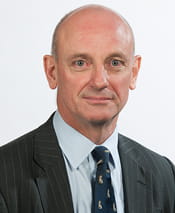Improving Surgical Training - A consultant's perspective
08 Nov 2017
Ian Eardley, Senior Vice-President at the Royal College of Surgeons

The College has been aware for some time that surgical training, particularly in the early years, is in trouble. The GMC National Training Survey and the JCST trainee survey show the combination of full shift working, rota gaps and excessive service has resulted in trainees not getting into theatre as much as they should do, with the consequence that they achieve lower levels of operative and clinical experience than we would wish during the early years of training.
In 2015, HEE invited the College to undertake a review of surgical training to identify a number of areas where surgical training could be improved.
We found that there had been an undue swing towards the need to deliver service at the expense of high quality training. Secondly, we felt that the training of young surgeons could be enhanced by improving the skills of their trainers and by increasing the time available for direct face-to-face training. It was quite clear from logbook evidence that many trainees leaving core surgical training do so with inadequate exposure to elective outpatient and theatre-based training. The main reason for this was the need, within a full shift system, to provide 24/7 cover. It was clear that unless there were at least ten doctors on a full shift rota, the amount of time available for elective daytime training was inadequate. This was exacerbated by problems with rota gaps, which is something many young trainees experience all too often.
The College was faced with the option of accepting the status quo or trying to do something about it. Happily, HEE was able to support us in developing an innovative training programme to try to make things better. There are a number of components to the project including:
- The project working group took the view that the product of the new programme of surgical training must remain the same as the current CCT holder. The trainees have been very clear that training currently produces a surgeon with an appropriate level of skills and competence for consultant practice, including developing a subspecialty interest, and any change must maintain this level.
- While it is accepted that full shift systems will continue to be needed in many parts of the country, it is important that the rotas are appropriate to allow elective daytime training. Therefore, the sites within the pilot training scheme will have a minimum of ten members of the surgical team on the rota which will deliver at least 60% elective daytime training.
- We recognise that there are not enough junior doctors to make such a rota realistic in many parts of the country. Greater integration of Physician Associates, Surgical Care Practitioners and Advanced Clinical Practitioners within the modern firm is a key initiative within the pilot to address this problem.
- Workplace training will be enhanced by improved access to simulation, both in the form of ‘boot camps’ and within the day to day training environment.
- Another area of substantial change within the pilot is the professionalisation of the role of the surgical trainer. It was accepted that trainers need enhanced skills to provide high quality training for their trainees. This requires extra skills, extra training and dedicated time in the job plan.
- Trainees progress at different rates, and while the current training system is effectively a time-based system, movement toward a competence-based system where trainees progress on the basis of their achievements would be advantageous.
- To facilitate progression, more frequent and regular formative and summative assessment with good feedback and self-reflection will be required using assessment of overall work.
At this stage, this is a pilot training programme only, and not a wholesale change. Recruitment is open for applicants now through Oriel, with interviews taking place in early 2018.
We will evaluate the new programme so we can assess how the initiatives are working and expect to have initial outcomes in the first two years.
We are confident that this new pilot training scheme will enhance surgical training. We are fully aware of the problems that currently exist, particularly in the early years, and this is an attempt to do something about them. We think that pilot trainees will benefit with both enhanced technical and non-technical skills and while there will inevitably be some teething problems along the way, we are hopeful that IST will improve both the quality and the overall experience of training for all surgeons in the future.
You can read a trainees view of the pilots here.
